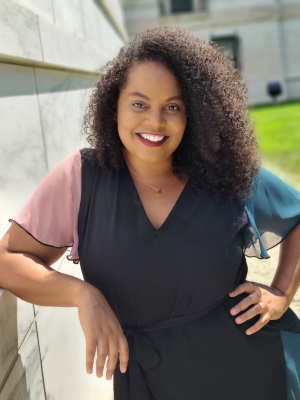Falling through the cracks: new Social Work faculty member works to improve outcomes for Black youth
 As Black youth and children are exposed to adverse childhood experiences, such as neglect, physical abuse, or emotional abuse, they are more likely to report higher numbers of depressive symptoms, substance use, and delinquency. This means that means that when Black youth are being neglected or abused, this leads to them feeling sad or hopeless, and they turn to using substances or acting out for a sense of relief. But how do we create prevention and intervention programs and practices to improve outcomes for Black youth and children? One of the newest faculty in the Wayne State University School of Social Work, Megan Hicks, PhD aims to do just that.
As Black youth and children are exposed to adverse childhood experiences, such as neglect, physical abuse, or emotional abuse, they are more likely to report higher numbers of depressive symptoms, substance use, and delinquency. This means that means that when Black youth are being neglected or abused, this leads to them feeling sad or hopeless, and they turn to using substances or acting out for a sense of relief. But how do we create prevention and intervention programs and practices to improve outcomes for Black youth and children? One of the newest faculty in the Wayne State University School of Social Work, Megan Hicks, PhD aims to do just that.
The subject of risk and protective factors that influence health disparities among Black youth is at the heart Hicks' research. As a new Assistant Professor of Social Work, Hicks' research is aptly suited for the community engaged social justice centric activities Wayne State is known for.
Hired as part of the University's call for researchers focused on the social and behavioral determinants of health, Hicks joined the School's faculty as a familiar face seen walking our Woodward halls. After completing her PhD in Human Development and Family Science at the University of Georgia in 2017, Hicks came to Detroit and accepted a post-doctoral fellowship working with Social Work Professor Poco Kernsmith and her research team on the prevention of violence perpetration among youth. Hicks also earned a Master of Science, Human Development and Family Science degree while at The University of Georgia and a Bachelors of Arts in Sociology degree from The Ohio State University.
Rooted in community-based research, Hicks examines sexual risk behaviors among Black youth and how individuals factors such as impulsivity, adverse childhood experiences, and emotion regulation impact those behaviors. Additionally, she studies prevention/intervention programming, program evaluation, and community education. "I have built great relationships with many Detroit organizations and I am eager to collaborate with them in the near future on my research," stated Hicks. "I think it is very important to engage in the community that you live in and work in. Therefore, I am very excited to have multiple community organizations that have expressed their interest in partnering with me in the future and to have those resources available."
Over the last two years in Detroit, Hicks has worked closely with area organizations and University partners to build a community network focused on understanding and improving the lives of Detroit youth. One such relationship is with the Detroit Phoenix Center, which focuses efforts on improving outcomes for high-risk and homeless Detroit youth. Recently Hicks served as a member of the Detroit Phoenix Center Blair Memorial Scholarship Committee that awarded 5 college scholarships to Detroit youth. Additionally, Hicks looks forward growing her relationships with University and School based organizations including W'sup, the Wayne State University Prevention Team, and the School's Association of Black Social Workers Student Organization (ABSW). "During my post-doc at Wayne, I served as a panelist for an event put on by the ABSW for Black History Month and it was at this event that I was introduced to W'sup. W'sup provides sexual health services to underserved, high-risk youth and young adults of color in the Detroit metro area. I am very excited to connect with them and see where I can serve," noted Hicks. "I love that my position at Wayne State introduces me to such a variety of individuals with varied life experience and organizations serving our community. This provides an invaluable learning opportunity for me to understand social problems from local community experts and those effected." Hicks' latest research featured in the July issue of the Journal of Child and Adolescent Trauma (2020) highlights how important it is to understand the contexts in which Black youth live and develop and how that knowledge on the specific type of victimization they experience can better inform prevention/intervention programs and practice.
Hicks will continue to support the School's mission to create and advance social work knowledge that promotes social justice, with a particular focus on urban communities as the Chair of the School's newly created Anti-Racism Committee.
I am excited to serve in this new role and increase efforts to empower social justice in the School, in the field of Social Work, and in the city of Detroit. - Megan Hicks
Learn more about Hicks via her faculty profile.